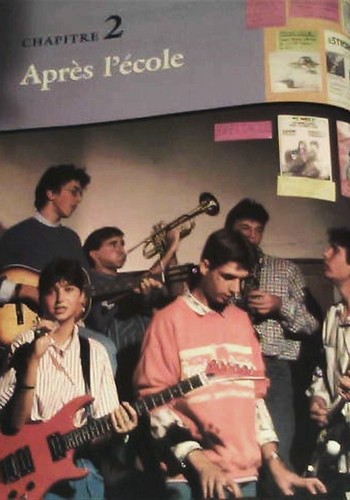Textbook French and False Expectations
 Four and a half years of French classes weren’t enough.
Four and a half years of French classes weren’t enough.
In 2006, I was attempting to return home from a trip to England, the same day a terrorist attempted to pass through airport security with liquid explosives.
All flights grounded, the crowds amassed. There were lines formed to enter the terminal. There were lines just to get in line. Weary airport officials handed out meal tickets to acquiesce the crowds, but the lines still multiplied like a game of Snake.
All I wanted was a boarding pass, but counter attendants dismissed everyone from one line to another, always on the vague promise that the next one might deliver more information.
But if there was one highlight in the frustration of it all, it was when a woman behind me tapped on my shoulder.
“Excusez-moi,” she said, “parlez-vous français ? ”
This was it! After years of studying French—well, I didn’t do much studying, I just got, as without really trying—finally, here was my first chance to speak French to a real French person! Magnifique !
“Oui, un peu,” I responded modestly, trying to mask my excitement.
She started to ask me something; I almost expected to see subtitles across her shoulders. Every velvety syllable she spoke was awash with the next, a beautiful, yet undecipherable mess.
I was dumbfounded. “Je suis desolée, je ne vous comprends pas” I said, shrugging apologetically. So much for thinking I was a natural at French.
I kept that incident in mind years later, as I was preparing for my first trip to France. Hopefully this time my foreign language skills would go further than explaining, in perfect French, that I didn’t actually understand French.
I pulled out an old textbook, which I may or may not have stolen from my high school. Glossing through the pages, I realized that reviewing Dr. & Mrs. Van Der Tramp verbs probably wouldn’t help much in the grand scheme of things.
The entirety of my French classes had emphasized reading, writing and grammar. Our listening skills came mostly through watching French-dubbed versions of American movies like Home Alone, and from cassettes of forced, slowly-spoken dialogue, where two French teenagers would discuss how the groupe de rock at last night’s boum was super-cool. In all, not exactly an authentic experience.

“Never mind about the grammar. ?Knowing the correct spelling of irregular verbs in the third-person-plural pluperfect form really won’t make a difference when half of the letters aren’t actually pronounced, anyway.”
“Textbook French is not everyday French.?When speaking casually, French speakers tend to drop the word ‘ne‘ from negative sentence constructions. They also don’t often use the phrase “Est-ce que...” to form questions; rather, the intonation of their voice will indicate a question. For example, you’ll hear “C’est vrai ? ” more often than “Est-ce que c’est vrai ? ” And: “C’est pas vrai” rather than “Ce n’est pas vrai.”
“Don’t get too informal. ?While shopping and dining, use the formal vous form to address staff members. When entering an establishment, a cheery “Bonjour Madame/Monsieur !“will go a long way in ensuring you don’t get treated like a tourist.
“Listen, listen, listen. ?In my experience, the best practice before going abroad is to listen to the language as much as possible. There are endless resources available online for free: podcasts, radio stations, and streaming videos. Even if you can hardly decipher a word of a French-language broadcast, simply hearing it will improve your own accent.”
“Idioms may not be what you think.? Americans use of the phrase “Ooh la la” is markedly different from the French “Oh là là“. Knowing the difference may spare you an awkward situation.”
“And remember: no one in France actually, seriously says, “Sacre bleu” !”
Of course, it’s very difficult to become fluent in any foreign language without thoroughly immersing yourself in it. But a little daily practice will go surprisingly far. And unlike trigonometry or physics, high school language classes are actually quite useful post-graduation.
Did you find that the french you learned at school was more formal and less ‘real’ than when you spoke it in France?
All Images © Molly Schoen







Brings back memories! I, too, thought I was fluent after just 1 year of junior high French 🙂
As a French professor at a Pennsylvania State University (Clarion), I often come across students who have had four or five years of high school French and cannot put a single sentence together. I agree with you that French textbooks leave a lot to be desired – I should write my own, but the task appears somewhat daunting. I try to keep my French classroom as communicative (and authentic, although a classroom is an artificial environment) as possible.
What kind of music does your band play?
Thanks for the comments!
Elizabeth: I agree–the way most languages are taught in American schools is very impractical. The emphasis on grammar is helpful, at least, when it comes to learning additional languages, but it doesn’t help much for actual speaking and communication.
We play mostly indie and folk music. 🙂